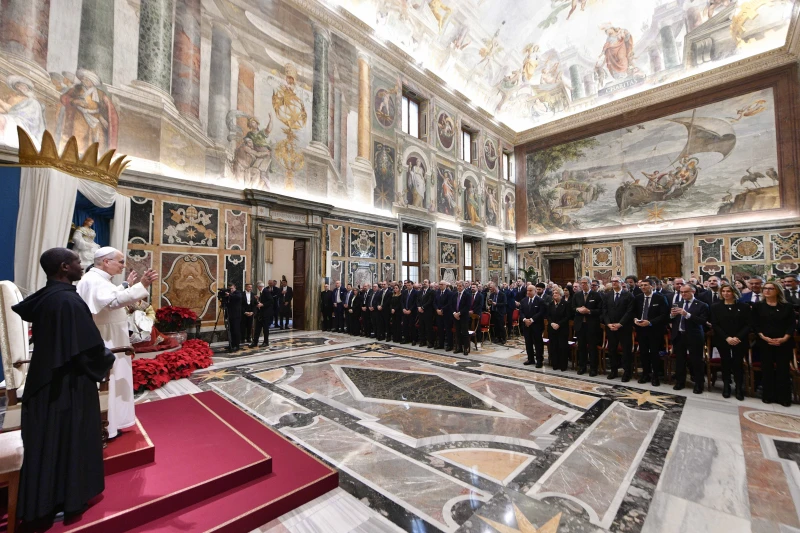At AmFest, Turning Point USA leaders leverage Kirk’s ‘martyrdom’ to rally young voters
PHOENIX (RNS) — On a stage framed by glinting red-white-and-blue lights, Michael Knowles, a podcaster for the political outlet The Daily Wire, recalled Jesus’ Sermon on the Mount, the New Testament’s signal call for mercy and hope.
“Blessed are the peacemakers, for they shall be called sons of God,” Knowles read on Thursday (Dec. 18) at opening night of AmericaFest, the annual conference of Turning Point USA, the conservative youth activist organization co-founded by Charlie Kirk.
There was no doubt that Kirk, who was assassinated in September, was the peacemaker Knowles had in mind. He was one of several speakers at the Phoenix Convention Center in the following days to paint Kirk as a spiritual unifier who connected disparate parts of the American right and reached out to progressives.
If Kirk had that power, this year’s AmFest, which closes on Sunday, has brought home how badly U.S. conservatism needs that kind of uniting presence. The movement’s cohesion has been tested in recent months by Tucker Carlson’s controversial interview with antisemitic internet influencer Nick Fuentes and by disputes over American support for Israel. It’s also been shaken by ongoing revelations tying Trump world figures to sexual predator Jeffrey Epstein and by roiling conspiracy theories, such as former Trump adviser Candace Owens’ suggestion that TPUSA is complicit in its own co-founder’s murder.
Kirk’s widow, Erika Kirk, acknowledged these rifts in her opening speech to the conference, saying: “We’ve seen fractures. We’ve seen bridges being burned that shouldn’t be burnt.”
Her warning went largely unheeded at AmFest, judging by speeches made from the stage, where Daily Wire co-founder Ben Shapiro, Carlson, former White House strategist Steve Bannon and journalist Megyn Kelly all used their speaking slots to swipe at each other.
On the floor, however, the college and high school students who make up the rank and file of Turning Point USA remained optimistic. Roughly one-third of the 31,000 who came to Phoenix for AmFest were students. Many said their campus chapters, which go on door-knocking campaigns ahead of elections and man tables to promote conservative values, are gaining traction in the wake of Kirk’s death.
Two Generation Z attendees, one from California and another from Louisiana, said they joined TPUSA chapters in response to Kirk’s assassination. In her speech, Erika Kirk told the audience that more than 140,000 students have applied to get involved with TPUSA Sept. 10, when Kirk died, bringing its student membership to more than a million. The organization is getting help from states such as Florida and Texas, which are working to make it easier to establish TPUSA Club America high school chapters.
Sixteen-year-old Sage Tousey, president of the Hamilton Southeastern Club America in Fishers, Indiana, told Religion News Service that her chapter swelled from 20 students to nearly 50 since Kirk was shot and that it has become more religious in outlook as it focuses on service projects such as placing wreaths on soldiers’ graves.
Tousey, a nondenominational Christian, suggested that religion is a more cohesive force than politics. “We will always say Christ first, politics second,” she said.
On Thursday’s warm, sunny morning in Phoenix, conservative politics and faith seemed to live side by side, with pro-Immigration and Customs Enforcement T-shirts being sold beside ones reading “Jesus Won.” And while Kirk’s death hung over the meeting, the young conservatives, their blue lanyards bright against the brown and gray streetscape of downtown Phoenix, were volubly excited for the sold-out event.
“It’s a bit of a homecoming,” said Jackson Heaberlin, 18, who serves as the outreach chair of the Clemson College Republicans at Clemson University in South Carolina. “You have all these months of very upsetting news, story after story of a left-wing radical violence, and then now you’re insulated in an environment of conservatives who are young and passionate.”
Even the disagreements among the headliners were taken as a sign of health. Attendees contrasted the sniping from the podium with cancel culture, which they see as standard procedure on the left. “In the conservative movement, we will not always agree on things, but we know that we can always come together under religion,” said Tousey.
Though TPUSA does have an arm that organizes pastors, TPUSA Faith, the core organization isn’t explicitly Christian — it describes its purpose as organizing students for limited government and free markets. Still, AmFest was saturated with religion. Attendees raptly listened to British comedian Russell Brand, who was baptized in 2024 and faces rape charges in Britain, urge the audience to build a Christian nation. Shapiro, who is Jewish, said the idea that God imbued humans with “creative capacity and the power to choose” is the “essence of conservatism.”
Kirk himself seemed to deepen his faith over his decade and more in the spotlight, and observers were watching the rhetoric at AmFest to see how much the organization will burnish its Christian brand moving forward.
“They want to promote this kind of above-politics thing with Charlie’s legacy,” said Matthew Boedy, a professor at the University of North Georgia who has studied TPUSA. Boedy pointed to a “clear divide” between the Christian ethic shown by Erika Kirk, who emotionally forgave the killer at Kirk’s Sept. 21 memorial service in nearby Glendale, Arizona, and Trump’s stating flatly on the same day: “I don’t forgive my enemies.”
In an interview last week, New York Times columnist Ross Douthat asked Andrew Kolvet, who has taken over as host of “The Charlie Kirk Show” podcast, whether conservative politics could use more “of the Erika Kirk spirit” than “Trumpian attitude.” Kolvet advocated for “a more conciliatory tone at times than our president,” while saying he appreciates Trump’s unapologetic approach.
At AmFest, the Rev. Lucas Miles, senior director of TPUSA Faith, described Erika Kirk as a “well-discipled” Christian, and Trump as a newer believer. “I think we’re just seeing a spectrum of … maturing in Christ and being conformed in the image of Christ,” he said.
The divide echoed a related debate among conservative Christians about guarding against empathy for immigrants — a theme that has puzzled even some prominent evangelical Christians as counter to Jesus’ teaching.
“The toxic empathy is getting so exhausting,” said Katie Turnbull, 25, who attended AmFest with her husband. “You hear huge pastors with huge churches preach to their congregations that love is love, and that we get to define love as opening the floodgates of our borders and bringing in the Third World.”
Some of those who addressed the conference, on the other hand, argued for making room for difference in U.S. society. On Friday, Vivek Ramaswamy, a former Republican candidate for president now running for Ohio governor, pushed back on the anti-immigrant sentiment that was in the air at the conference. A Hindu and the child of immigrants from India, Ramaswamy told the audience that normalizing hatred toward any ethnic group has “no place in the future of the conservative movement.”
These kinds of sentiments were a minority view, however. While at times critical of Trump’s tone, most attendees viewed the president’s aggressive anti-immigrant policy as above reproach. Several younger attendees hoped for broader restrictions even on legal immigration and combined concerns about immigration with broader fears about the rise of Islam, which they view as aggressively anti-Christian.
Gwyn Andrews, 22, who founded a TPUSA chapter at the University of West Georgia, expressed concern about the “Islamic faith issue that has been infiltrating our cities, our colleges,” adding that “a big issue for me personally is to make sure that people truly understand the Islamic faith and how that directly ties to socialism, as we’ve seen in New York City with Mamdani,” referring to New York’s Muslim mayor-elect.
She said that for American society to thrive, Muslim immigrants need to assimilate, a word that cropped up consistently at AmFest. “The goal is for them to understand that when you assimilate here, you can’t go to Dearborn, Michigan, and turn the entire place into a Third World country and then try to implement Shariah law,” she said.
Anti-Muslim sentiment is nothing new to TPUSA. Kirk long argued that Islam is not compatible with the West and that to be American requires that you “worship God, not Allah.” In a recent episode of “The Charlie Kirk Show,” Jewish conservative political commentator Josh Hammer argued that to be considered an American, one ought to “publicly assimilate into the Protestant-majority inherited culture.”
But in Phoenix, Miles framed assimilation as a faith question, saying God instructed his followers to welcome foreigners passing through, but stressed that those who stayed, like the biblical figure Ruth, chose to assimilate. Those wanting to “keep their own identity and maybe usurp and take advantage,” he said, “the Hebrews were warned … to keep them at bay.”
AmFest’s insistence on Christian dominance over national policy, said Christina Littlefield, associate professor of communication and religion at Pepperdine University, veers into Christian nationalism, the idea that the government should privilege a particular vision of Christianity at the cost of democratic pluralism.
Portraying Kirk, who often argued that America should be a Christian nation, as a martyr is “radicalizing” for many conservatives, said Littlefield, co-author of “Christian America and the Kingdom of God” with Richard T. Hughes, a dynamic she called dangerous. “Someone killed him because they did not like his political beliefs, which I condemn, but he did not die as a martyr for the faith.”
While TPUSA is openly mourning Kirk’s death, it’s also leveraging his story to rally Christian pastors and recruit voters. Miles told RNS that TPUSA Faith’s network jumped from 4,200 member churches prior to Kirk’s death, to 9,500, and is now planning a “Make Heaven Crowded Tour,” hosting faith events at churches in more than 25 cities. A new, free curriculum, First Truths, examining the fundamentals of the Christian faith is already available, and next year, the group will release another curriculum critiquing Islam.
At AmFest, Miles and other speakers appealed to faith to end the infighting seen on the stage, imbuing the organization’s political power with spiritual stakes.
“If we don’t unify as the body of Christ, then we are in a position where we are vulcanized, we’re fractured,” Miles told attendees at a breakout session. Christian unity, he said, is needed to hold the line “when it comes to Marxism, when it comes to Islam, when it comes to progressivism, when it comes to abortion.”










